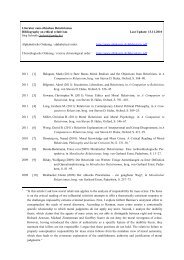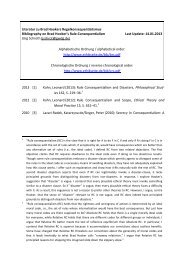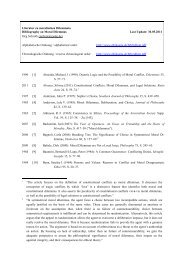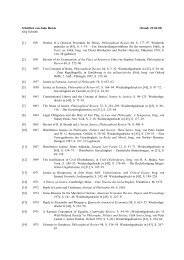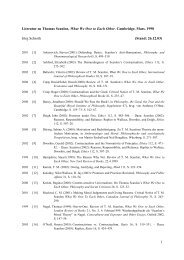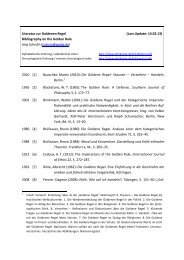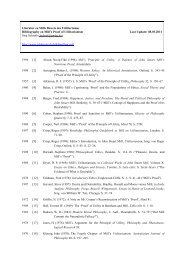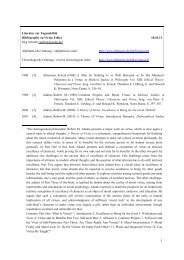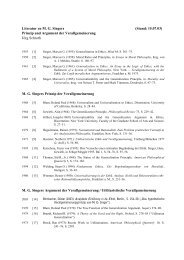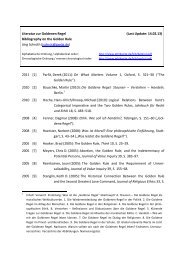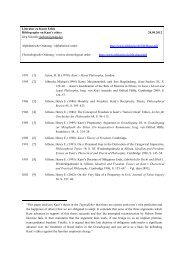Chronologische - Ethikseite
Chronologische - Ethikseite
Chronologische - Ethikseite
You also want an ePaper? Increase the reach of your titles
YUMPU automatically turns print PDFs into web optimized ePapers that Google loves.
2001 [601] Brinkmann, Walter (2001): Die Goldene Regel und der Kategorische Imperativ: Rationalität<br />
und praktische Notwendigkeit, in Kant und die Berliner Aufklärung. Akten des IX.<br />
Internationalen Kant-Kongresses, hrsg. von Volker Gerhardt, Rolf-Peter Horstmann<br />
und Ralph Schumacher, Berlin, New York, Bd. III, S. 13–20.<br />
2001 [602] Bubner, Rüdiger (2001): Another Look at Maxims, in Kant’s Legacy: Essays in Honor of<br />
Lewis White Beck, hrsg. von Predrag Cicovacki, Rochester, S. 245–59.<br />
2001 [603] Cicovacki, Predrag (2001): Zwischen gutem Willen und Kategorischem Imperativ. Die Zweideutigkeit<br />
der menschlichen Natur in Kants Moralphilosophie, in Systematische<br />
Ethik mit Kant, hrsg. von Hans-Ulrich Baumgarten und Carsten Held, Freiburg, S.<br />
330–54.<br />
2001 [604] Clohesy, William W. (2001): Seeking Altruism in Kant’s Practical Philosophy, in Kant und die<br />
Berliner Aufklärung. Akten des IX. Internationalen Kant-Kongresses, hrsg. von<br />
Volker Gerhardt, Rolf-Peter Horstmann und Ralph Schumacher, Berlin, New York,<br />
Bd. III, S. 159–65.<br />
2001 [605] Cramer, Konrad (2001): „Depositum“ – Zur logischen Struktur eines Kantischen Beispiels für<br />
moralisches Argumentieren, in Kant und die Berliner Aufklärung. Akten des IX. Internationalen<br />
Kant-Kongresses, hrsg. von Volker Gerhardt, Rolf-Peter Horstmann und<br />
Ralph Schumacher, Berlin, New York, Bd. 1, S. 116–130. – Vgl. dazu [503], [506].<br />
2001 [606] Cunningham, Anthony (2001): The Heart of What Matters. The Role for Literature in Moral<br />
Philosophy, Berkeley, S. 20–68 (“The Aim of Ethical Theory”), 158–79 (“Kant,<br />
Moral Conflict, and Tragedy”).<br />
2001 [607] Edwards, Jeffrey (2001): Material Conditions of Practical Principles in Kant’s Kritik der praktischen<br />
Vernunft, in Kant und die Berliner Aufklärung. Akten des IX. Internationalen<br />
Kant-Kongresses, hrsg. von Volker Gerhardt, Rolf-Peter Horstmann und Ralph Schumacher,<br />
Berlin, New York, Bd. III, S. 182–93.<br />
2001 [608] Enskat, Rainer (2001): Autonomie und Humanität. Wie kategorische Imperative die<br />
Urteilskraft orientieren, in Systematische Ethik mit Kant, hrsg. von Hans-Ulrich<br />
Baumgarten und Carsten Held, Freiburg, S. 82–123.<br />
2001 [609] Esser, Andrea (2001): Kant und moralische Konflikte, in Kant und die Berliner Aufklärung.<br />
Akten des IX. Internationalen Kant-Kongresses, hrsg. von Volker Gerhardt, Rolf-Peter<br />
Horstmann und Ralph Schumacher, Berlin, New York, Bd. III, S. 194–201.<br />
2001 [610] Esser, Andrea (2008): Kant on Solving Moral Conflicts, in Kant’s Ethics of Virtue, hrsg. von<br />
one’s actions. I try to show this by pointing out an instability in the Kantian understanding of maxims. On<br />
the one hand, maxims are thought of as consciously affirmed, subjective principles of action. On the other<br />
hand, Kantians claim that nothing counts as an action, nor as morally assessable, unless it has a maxim.<br />
One cannot take both thoughts seriously without implausibly constricting the range of behavior that counts<br />
as action, hence as morally assessable. This difficulty can be overcome, I suggest, by jettisoning the idea<br />
that maxims must be consciously affirmed, and by stressing the way in which maxims are grounded in the<br />
pruning and shaping of one’s emotions and desires during socialization. This opens the door to a rich<br />
Kantian theory of virtue. It also raises questions about the scope and ground of our moral responsibility,<br />
which I address at the end of the paper.”



